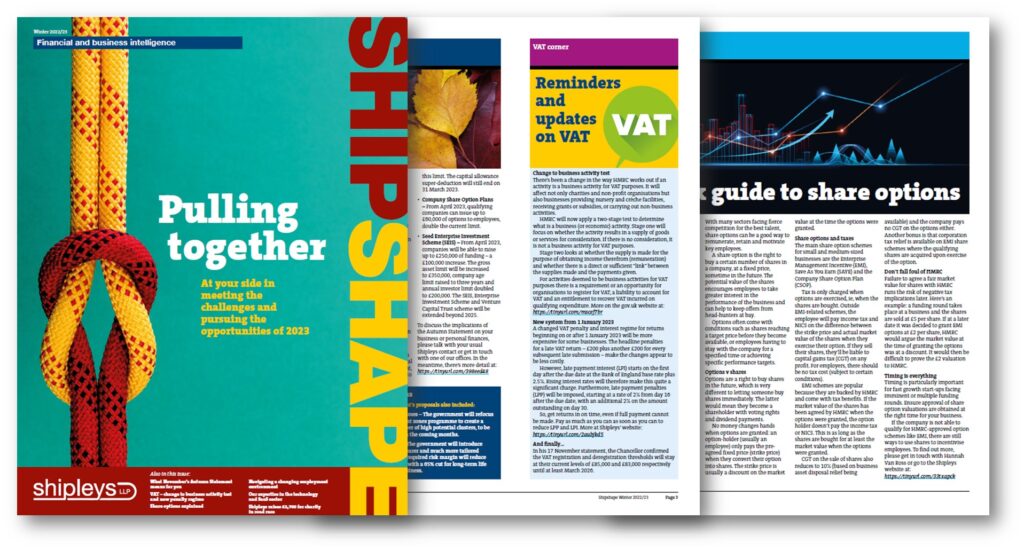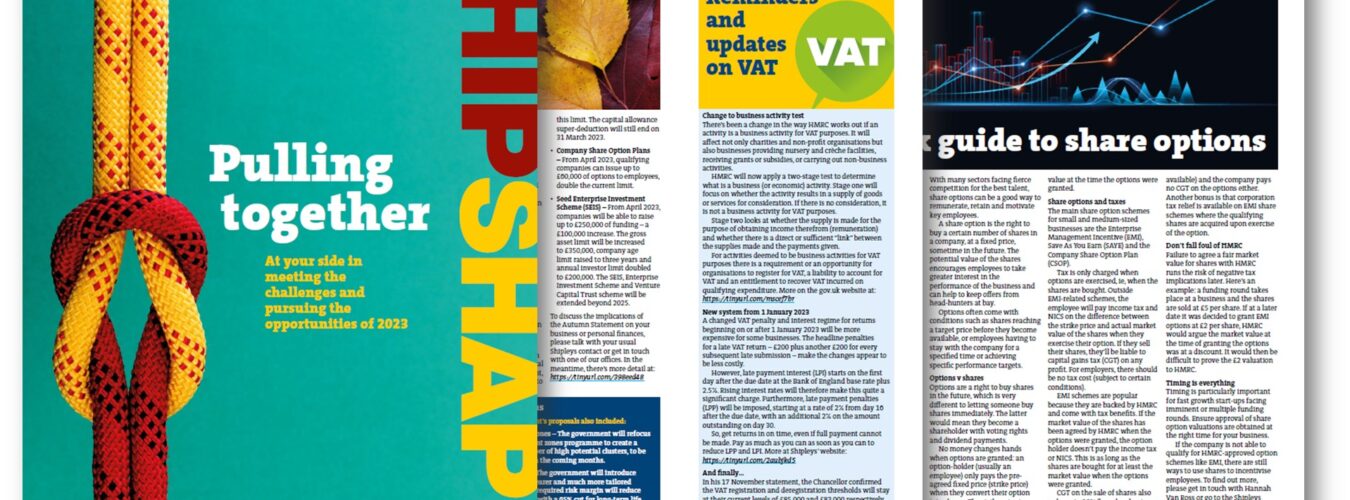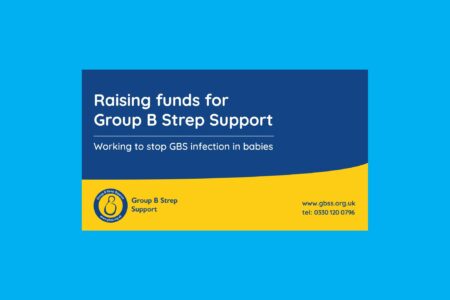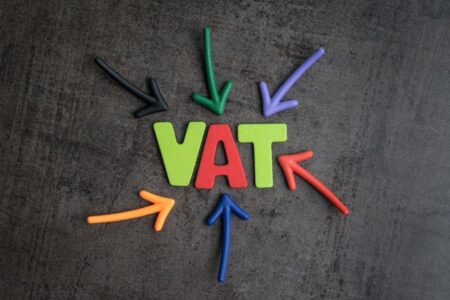Managing Principal Viewpoint
All hands on deck
7 December 2022

What a turbulent autumn it proved to be on the political and economic stage. Most clients I speak with are now hoping for some much-needed respite after the recent turmoil.
Standing by you
A period of stability may be a little slow in coming, given the Bank of England’s recent forecast that the UK economy will remain in recession throughout 2023.
In my last viewpoint, I stressed the importance of reviews, budgeting and planning to help organisations and individuals manage the current challenges. That is still vital and Shipleys has been busy helping clients make sense of the numerous changes in the fiscal landscape.
For now, Jeremy Hunt’s Autumn Statement on 17 November sets the scene for the coming years, although we are expecting potential refinements in the Spring Budget.
Mixed blessings
Our summary of Mr Hunt’s statement is on pages 2-3. It shows that while there were few changes to tax rates, the freezing of many thresholds and reductions in allowances for areas such as dividends and capital gains mean that people will be paying more tax.
With employers trying to support staff facing rising living costs, it’s important to assess the implications pay rises will bring to people’s tax liability. A case in point is the 45% additional rate of tax. With the threshold reduced from £150,000 to £125,140, the Institute of Fiscal Studies anticipates the number of additional tax rate payers will swell to over 1 million (up from 236,000 when introduced in 2010-11).
Don’t forget too that once you earn over £125,140, you don’t benefit from the personal allowance or personal savings allowance.
Tread carefully
It’s important to make the most of any allowances and reliefs available to you. Don’t forget to fully utilise pension contributions, gift aid contributions, annual investment allowances and tax- free savings. Individual savings accounts still offer tax exemption for investment income and gains.
Careful planning will also help. The inheritance tax threshold freeze means more estates will be liable. Consider measures such as gifting and trusts to help reduce that burden. For more on this, see this recent article about giving gifts and inheritance tax.
Business owners may also want to assess the impact of the reduction in the tax-free dividend allowance and the retained increases to corporation tax from April 2023.
The reduction in the capital gains tax allowance comes with ramifications. For example, those who have invested in buy-to-let property may want to review their investments.
Rest assured, you are not alone in trying to navigate these changes. Our experts are monitoring the latest developments and can advise you on your individual circumstances.
Growth and innovation
The Chancellor was keen to support innovation in his Autumn Statement and increased the amount companies can raise through the Seed Enterprise Investment Scheme. This and the Enterprise Investment Scheme and Venture Capital Scheme are being extended beyond 2025.
While the Annual Allowance Super Deduction ends in 2023, the Annual Investment Allowance (for tax-free investments in qualifying machinery and equipment) has been permanently set at £1m.
There were mixed outcomes for research and development tax reliefs, with increases for large companies, but reductions for those using the SME scheme. With the latter it will mean a lot less money coming back into businesses, particularly when combined with the PAYE cap from last year and the fact that, from April, all R&D has to be incurred in the UK to qualify.
We will closely follow the consultation on proposed reforms to creative industry tax relief schemes. Please speak with our respective sector specialists to discuss further.
Supporting staff
2022 has seen record lows in unemployment and most employers we speak with are keen to find affordable ways to support and retain staff. This is prompting more innovative approaches to pay, for example through cost- of-living bonuses, reworking commission policies, introducing long service awards and providing employer loans. As I write, Tesco has been in the news for offering its UK staff pay advances.
Our recent Business Club discussed how employment is evolving in the face of current demands. There’s a summary of the insights shared on page 5. We’ve also explained how share options can be used to help retain staff (page 4).

Download your copy of Shipshape Winter 2022/23
Season’s greetings
With 2023 on the horizon, Shipleys remains steadfast in our ability and passion to help clients survive and thrive. We are here to help you.
On behalf of all the Shipleys team I wish you good health, comfort and happiness in 2023.
Steve
Steve Foster, Managing Principal

Shipshape articles are intended to create awareness of issues and specific advice should be obtained before taking action, or refraining from taking action in relation to the topics covered. If you would like advice or further information, please speak to your usual Shipleys contact.
Copyright © Shipleys LLP 2022















